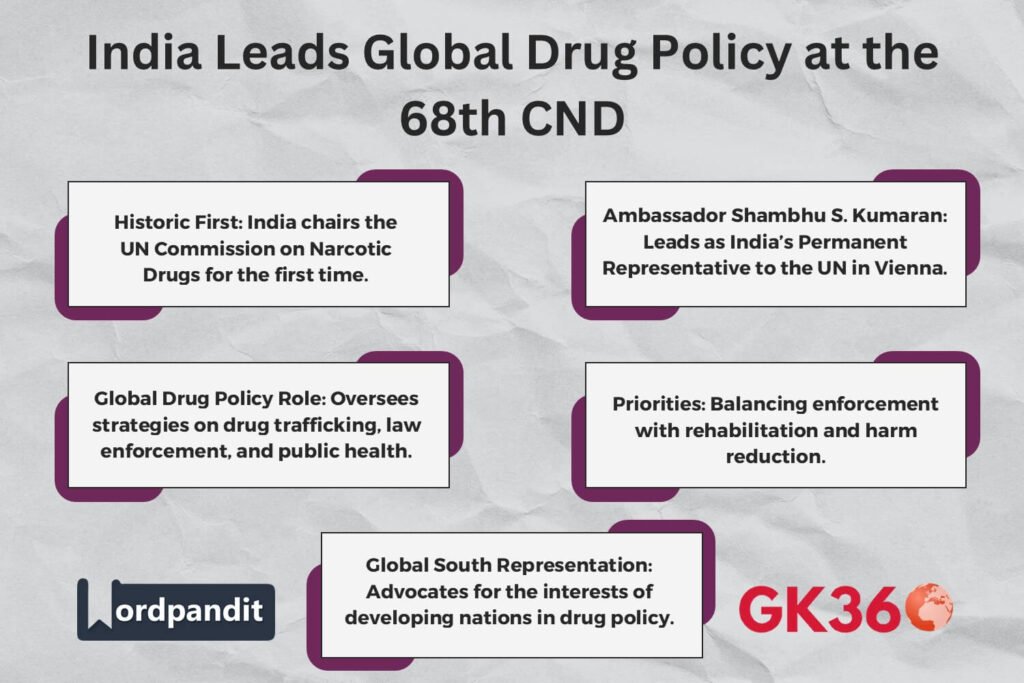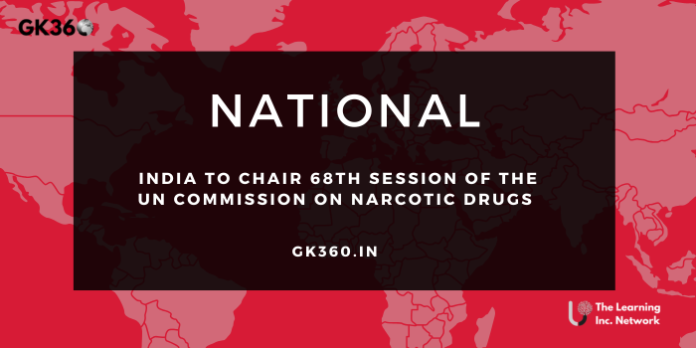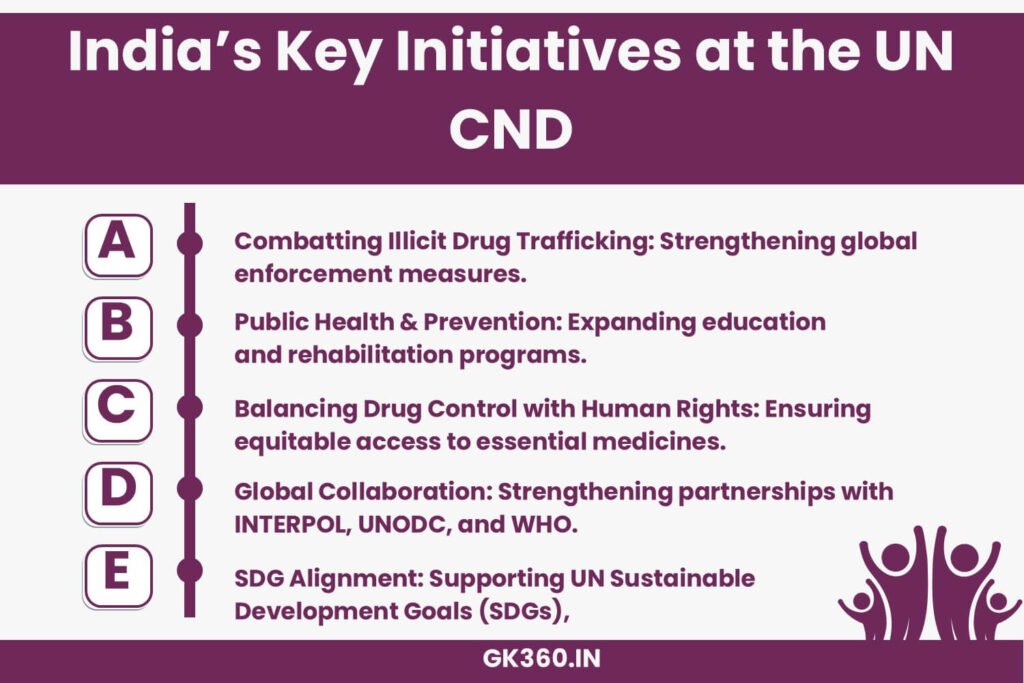India Chairs 68th UN Commission on Narcotic Drugs: Impact & Key Initiatives
Introduction: India’s Historic Chairmanship
India has reached a significant diplomatic milestone by being elected to chair the 68th Session of the United Nations Commission on Narcotic Drugs (CND) for the first time. This achievement reinforces India’s leadership in global drug policy and international governance. Ambassador Shambhu S. Kumaran, India’s Permanent Representative to the UN in Vienna, has assumed the chairmanship, signaling the country’s commitment to tackling global drug challenges through policy advocacy, international collaboration, and evidence-based solutions.

Table of Contents
- Understanding the UN Commission on Narcotic Drugs (CND)
- Key Responsibilities of the CND
- India’s Leadership at the 68th CND
- Major Focus Areas Under India’s Chairmanship
- India’s Domestic Drug Control Efforts
- Impact of India’s Leadership in the CND
- FAQs on India’s Role in the CND
- Conclusion: India’s Role in Shaping Global Drug Policies
Understanding the UN Commission on Narcotic Drugs (CND)
What is the CND?
The CND operates as a key policy-making body under the United Nations Economic and Social Council (ECOSOC), overseeing global strategies related to drug control, prevention, and law enforcement. It plays a pivotal role in ensuring that international drug policies align with human rights, public health, and development objectives.
Role of the UNODC in Global Drug Policy
The United Nations Office on Drugs and Crime (UNODC), headquartered in Vienna, works closely with the CND to implement international drug control treaties and monitor global drug trends. The UNODC supports member states in combatting drug trafficking, substance abuse, and organized crime.
Key Responsibilities of the CND
- Monitoring Global Drug Trends: Analyzing patterns in drug production, trafficking, and abuse to inform international policy.
- Policy Recommendations & International Treaties: Advising member states on policies that integrate law enforcement, healthcare, and human rights.
- Oversight of Drug Conventions: Supervising adherence to treaties like the Single Convention on Narcotic Drugs (1961) and the Convention on Psychotropic Substances (1971).
India’s Leadership at the 68th CND
Goals and Priorities
India’s chairmanship of the 68th CND Session reflects its diplomatic stature and strategic interests. As Chair, India aims to:
- Represent the Global South: Ensuring developing nations have a voice in shaping global drug policies.
- Promote Evidence-Based Strategies: Balancing law enforcement with harm reduction and rehabilitation initiatives.
- Enhance International Cooperation: Strengthening cross-border partnerships to combat drug trafficking.
- Improve Access to Essential Medicines: Advocating for fair access to controlled substances for medical use in under-resourced regions.
Role of Ambassador Shambhu S. Kumaran
Ambassador Shambhu S. Kumaran, India’s Permanent Representative to the UN in Vienna, has assumed the chairmanship of the 68th CND. His tenure is expected to focus on:
- Collaborative Solutions: Strengthening cooperation between nations for a balanced approach to drug policy.
- Inclusive Decision-Making: Ensuring that policies reflect the perspectives of both developing and developed nations.
- Data-Driven Approaches: Promoting policies that rely on scientific research and global best practices.
Major Focus Areas Under India’s Chairmanship
1. Combatting Illicit Drug Trafficking
India aims to lead discussions on dismantling global drug trafficking networks and improving law enforcement collaboration. Key measures include:
- Strengthening Border Security: Enhancing surveillance and cooperation with neighboring countries.
- Intelligence Sharing: Collaborating with international agencies like INTERPOL and UNODC to track drug smuggling operations.
- Crackdown on Synthetic Drugs: Addressing the rise of synthetic opioids and designer drugs through stricter regulations.
2. Strengthening Public Health & Prevention Measures
By promoting awareness campaigns and evidence-based policies, India seeks to enhance substance abuse prevention, particularly among youth and vulnerable populations.
- Awareness Programs: Expanding educational initiatives to prevent drug abuse in schools and communities.
- Rehabilitation & Treatment: Encouraging investment in addiction recovery programs and mental health support.
- Harm Reduction Strategies: Advocating for measures such as needle exchange programs and opioid substitution therapy.
3. Aligning with Sustainable Development Goals (SDGs)
The CND’s initiatives align with the United Nations Sustainable Development Goals (SDGs), particularly:
- Goal 3: Good Health and Well-being – Reducing drug abuse and its impact on public health.
- Goal 16: Peace, Justice, and Strong Institutions – Strengthening law enforcement and justice systems to combat organized crime.
India’s Domestic Drug Control Efforts
NDPS Act and Law Enforcement Strategies
India’s Narcotic Drugs and Psychotropic Substances (NDPS) Act forms the legal foundation for domestic drug control. The government continues to implement stringent measures to curb trafficking and misuse, including:
- Strict Punishments: Heavy penalties, including imprisonment and fines, for drug trafficking and illegal possession.
- Surveillance & Seizures: Increased monitoring of drug movements through intelligence agencies.
- Specialized Task Forces: Dedicated anti-narcotics agencies working to dismantle drug networks.
Global Collaborations in Drug Policy
India actively participates in international forums to combat drug-related crimes, collaborating with:
- INTERPOL: Sharing intelligence to track international drug syndicates.
- UNODC: Partnering on policy development and drug prevention strategies.
- Regional Partnerships: Strengthening cooperation with South Asian and Southeast Asian nations for cross-border enforcement.
Impact of India’s Leadership in the CND
Influence on Global South Representation
India’s chairmanship provides a platform for developing nations to have a stronger voice in global drug policy. Key contributions include:
- Advocating for Balanced Policies: Ensuring that drug control strategies consider both enforcement and rehabilitation.
- Addressing Socioeconomic Factors: Highlighting the role of poverty and lack of education in substance abuse.
- Strengthening South-South Cooperation: Enhancing partnerships with other developing countries for mutual support in drug policy reforms.
Strengthening Diplomatic Relations
By leading the CND, India reinforces its role as a key player in global governance and multilateral negotiations. Major diplomatic benefits include:
- Enhanced Global Credibility: Establishing India as a leader in international drug policy.
- Increased Bilateral Cooperation: Strengthening diplomatic ties with countries facing similar drug-related challenges.
- Influencing Policy Direction: Contributing to shaping future UN resolutions on narcotic control.
FAQs on India’s Role in the CND
1. What is the role of the UN Commission on Narcotic Drugs (CND)?
The CND formulates international drug policies and monitors their implementation through the UNODC. It oversees global drug control strategies, balancing enforcement with health and human rights considerations.
2. How does India’s leadership impact global drug policies?
India’s chairmanship allows it to influence international strategies, particularly in balancing strict enforcement with public health approaches, rehabilitation, and sustainable drug control measures.
3. What are India’s key strategies to combat drug trafficking?
India emphasizes international cooperation, technology-driven enforcement, cross-border intelligence sharing, and community-based prevention programs to counter drug trafficking.
4. How does the CND align with Sustainable Development Goals (SDGs)?
The CND’s policies support SDGs such as Goal 3 (Good Health and Well-being) by promoting drug prevention and treatment, and Goal 16 (Peace, Justice, and Strong Institutions) by tackling organized crime and illicit drug networks.
5. How does India’s NDPS Act align with global drug control efforts?
India’s Narcotic Drugs and Psychotropic Substances (NDPS) Act ensures strict regulations on drug trafficking while incorporating provisions for rehabilitation and medical access to controlled substances.
Conclusion: India’s Role in Shaping Global Drug Policies
India’s election as Chair of the 68th CND Session marks a significant step in its diplomatic journey. As a key voice in global drug policy, India is committed to fostering balanced strategies that integrate law enforcement, rehabilitation, and international cooperation.
Key Takeaways
| Aspect | Details |
|---|---|
| India’s Chairmanship | India chairs the 68th UN Commission on Narcotic Drugs for the first time. |
| Key Representative | Ambassador Shambhu S. Kumaran leads India’s initiatives at the UN. |
| Global Drug Policy Focus | Strengthening law enforcement, public health measures, and global cooperation. |
| Key Challenges | Combatting drug trafficking, organized crime, and balancing regulation with medical access. |
| India’s Domestic Drug Policies | Governed under the NDPS Act, with strict anti-trafficking measures and rehabilitation programs. |
| Global Collaboration | Working with INTERPOL, UNODC, and other UN agencies to tackle cross-border drug issues. |
| Impact on Developing Nations | Strengthening Global South representation in international drug policy discussions. |
Related Terms:
- India chairs 68th UN CND
- Global drug policy India
- UN Commission on Narcotic Drugs leadership
- Ambassador Shambhu Kumaran UNODC
- India’s role in international drug policy
- Drug trafficking prevention strategies
- CND and Sustainable Development Goals
- NDPS Act India drug laws
- UNODC and global drug control
- India’s international diplomatic leadership






